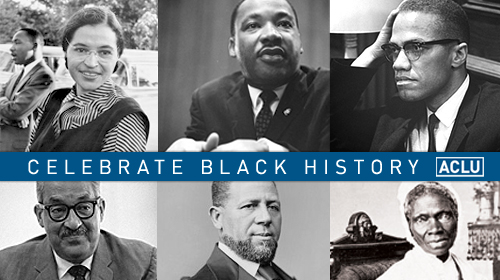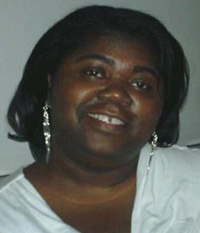
Black History Month is an opportune time to talk about how Blacks are disenfranchised of their ability to pursue the American dream. Too easily, a bad decision can cause a person to lose their ability to participate in society and unfortunately a person’s skin color can affect what happens to them once they enter the judicial process in America.
Growing up in a small southern town in the heart of “Klan Country,” you can only imagine what it must have been like, especially for young Black men in our community. I have childhood memories of racial disparity that are still relevant today. Although I was a young child when Martin Luther King was murdered, his actual death is vague. But I vividly remember how his death affected my community.

Alicia Gathers has been a paralegal at the ACLU’s National Prison Project for eight years. Although originally from North Carolina, she has lived in the DC metro area for 24 years. She enjoys reading Black history and literature by Maya Angelou and Toni Morrison. She attended East Carolina University.
The country was in an uproar after Dr. King’s death with riots from coast to coast. Just as the rest of the country was angry and grief stricken, so were five young Black men in North Carolina who decided to vent their anger and frustration by burning down the Ku Klux Klan meeting house. In 1968, their audacity could’ve meant death, but thankfully the Black community rallied around them to make sure that they were safe and made it to trial.
As luck would have it, only the door of the building burned. All five men were arrested and eventually sentenced to 10 years of hard labor at the state penitentiary. There was such an uproar and outcry of disgust at the sentencing that the NAACP stepped in, appealed the verdict and all of the men were released and placed on probation.
Those five young men got a second chance and all went on to live productive lives — attend college, join the military, work in careers of their choosing. In contrast, there are so many young men and women today who can’t rebuild their lives after being convicted of a felony. Time spent behind bars is supposed to “pay your debt to society” for the crime committed. When you’ve completed your sentence, you’re supposed to get out and be able to start over, rebuild your life. This is not possible for many who can’t find jobs, live in certain places and can’t qualify for a government grants to attend college.
Our overcrowded jails and prisons are filled with people who have been over-sentenced and know that there are challenges ahead once they leave. If every door is shut, it is impossible for them to support themselves and families, and rejoin society. I’m not condoning criminal behavior, but the laws need to change so that people with records get a second chance.
Who knows what would have become of my brother and cousins in North Carolina if these laws were in place back in 1968.
This blog post is one of several personal testimonials written by ACLU staff members to commemorate Black History Month.
Do you know who’s pictured in our Celebrate Black History logo? Top row, from left to right: Rosa Parks, Martin Luther King, Jr. and Malcolm X. Bottom row, from left to right: Thurgood Marshall, Hiram Rhodes Revels and Sojourner Truth.
Learn more about overincarceration: Sign up for breaking news alerts, follow us on Twitter, and like us on Facebook.




